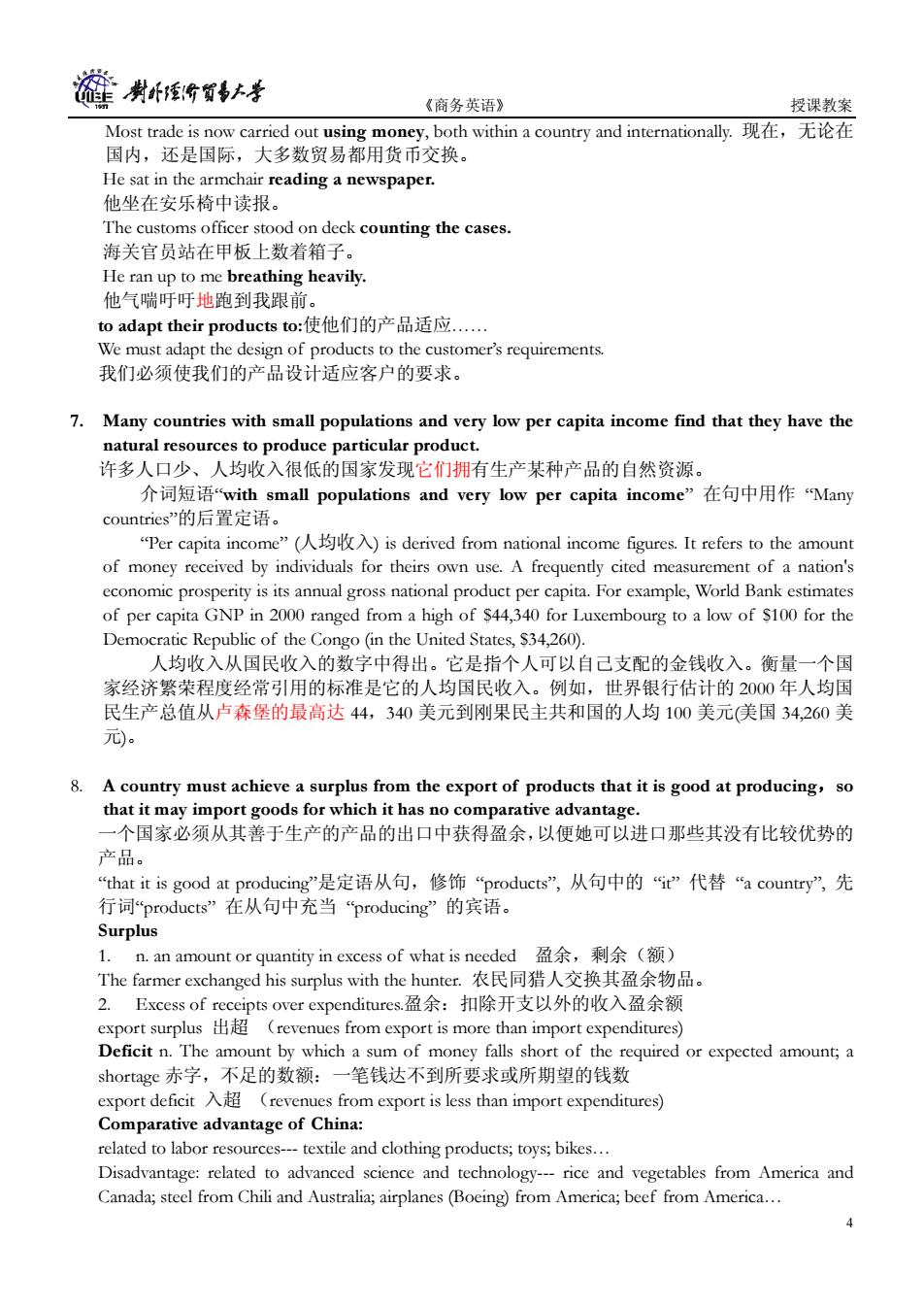正在加载图片...

生 尉仟所蜀号大学 《商务英语》 授课教案 Most trade is now carried out using money,both within a country and internationally.现在,无论在 国内,还是国际,大多数贸易都用货币交换。 He sat in the armchair reading a newspaper. 他坐在安乐椅中读报。 The customs officer stood on deck counting the cases. 海关官员站在甲板上数着箱子。 He ran up to me breathing heavily. 他气喘吁吁地跑到我跟前。 to adapt their products to:使他们的产品适应 We must adapt the design of products to the customer's requirements. 我们必须使我们的产品设计适应客户的要求。 7.Many countries with small populations and very low per capita income find that they have the natural resources to produce particular product. 许多人口少、人均收入很低的国家发现它们拥有生产某种产品的自然资源。 介词短语“with small populations and very low per capita income'”在句中用作Many countries'的后置定语。 Per capita income'”(人均收入)is derived from national income figures..It refers to the amount of money received by individuals for theirs own use.A frequently cited measurement of a nation's economic prosperity is its annual gross national product per capita.For example,World Bank estimates of per capita GNP in 2000 ranged from a high of $44,340 for Luxembourg to a low of S100 for the Democratic Republic of the Congo (in the United States,S34,260) 人均收入从国民收入的数字中得出。它是指个人可以自己支配的金钱收入。衡量一个国 家经济繁荣程度经常引用的标准是它的人均国民收入。例如,世界银行估计的2000年人均国 民生产总值从卢森堡的最高达44,340美元到刚果民主共和国的人均100美元(美国34,260美 元 8. A country must achieve a surplus from the export of products that it is good at producing,so that it may import goods for which it has no comparative advantage. 一个国家必须从其善于生产的产品的出口中获得盈余,以便她可以进口那些其没有比较优势的 产品。 “that it is good at producing'”是定语从句,修饰“products'”,从句中的ir”代替a country'”,先 行词products'”在从句中充当producing”的宾语。 Surplus 1.n.an amount or quantity in excess of what is needed盈余,剩余(额) The farmer exchanged his surplus with the hunter.农民同猎人交换其盈余物品。 2.Excess of receipts over expenditures..盈余:扣除开支以外的收入盈余额 export surplus(revenues from export is more than import expenditures) Deficit n.The amount by which a sum of money falls short of the required or expected amount;a shortage赤字,不足的数额:一笔钱达不到所要求或所期望的钱数 export deficit(revenues from export is less than import expenditures) Comparative advantage of China: related to labor resources---textile and clothing products;toys;bikes... Disadvantage:related to advanced science and technology---rice and vegetables from America and Canada;steel from Chili and Australia;airplanes(Boeing)from America;beef from America...《商务英语》 授课教案 4 Most trade is now carried out using money, both within a country and internationally. 现在,无论在 国内,还是国际,大多数贸易都用货币交换。 He sat in the armchair reading a newspaper. 他坐在安乐椅中读报。 The customs officer stood on deck counting the cases. 海关官员站在甲板上数着箱子。 He ran up to me breathing heavily. 他气喘吁吁地跑到我跟前。 to adapt their products to:使他们的产品适应…… We must adapt the design of products to the customer’s requirements. 我们必须使我们的产品设计适应客户的要求。 7. Many countries with small populations and very low per capita income find that they have the natural resources to produce particular product. 许多人口少、人均收入很低的国家发现它们拥有生产某种产品的自然资源。 介词短语“with small populations and very low per capita income” 在句中用作 “Many countries”的后置定语。 “Per capita income” (人均收入) is derived from national income figures. It refers to the amount of money received by individuals for theirs own use. A frequently cited measurement of a nation's economic prosperity is its annual gross national product per capita. For example, World Bank estimates of per capita GNP in 2000 ranged from a high of $44,340 for Luxembourg to a low of $100 for the Democratic Republic of the Congo (in the United States, $34,260). 人均收入从国民收入的数字中得出。它是指个人可以自己支配的金钱收入。衡量一个国 家经济繁荣程度经常引用的标准是它的人均国民收入。例如,世界银行估计的 2000 年人均国 民生产总值从卢森堡的最高达 44,340 美元到刚果民主共和国的人均 100 美元(美国 34,260 美 元)。 8. A country must achieve a surplus from the export of products that it is good at producing,so that it may import goods for which it has no comparative advantage. 一个国家必须从其善于生产的产品的出口中获得盈余,以便她可以进口那些其没有比较优势的 产品。 “that it is good at producing”是定语从句,修饰 “products”, 从句中的 “it” 代替 “a country”, 先 行词“products” 在从句中充当 “producing” 的宾语。 Surplus 1. n. an amount or quantity in excess of what is needed 盈余,剩余(额) The farmer exchanged his surplus with the hunter. 农民同猎人交换其盈余物品。 2. Excess of receipts over expenditures.盈余:扣除开支以外的收入盈余额 export surplus 出超 (revenues from export is more than import expenditures) Deficit n. The amount by which a sum of money falls short of the required or expected amount; a shortage 赤字,不足的数额:一笔钱达不到所要求或所期望的钱数 export deficit 入超 (revenues from export is less than import expenditures) Comparative advantage of China: related to labor resources--- textile and clothing products; toys; bikes… Disadvantage: related to advanced science and technology--- rice and vegetables from America and Canada; steel from Chili and Australia; airplanes (Boeing) from America; beef from America…